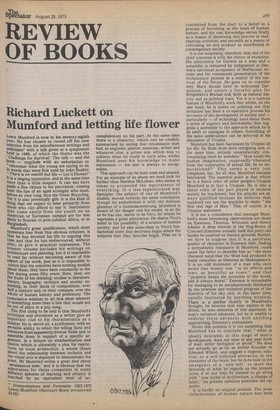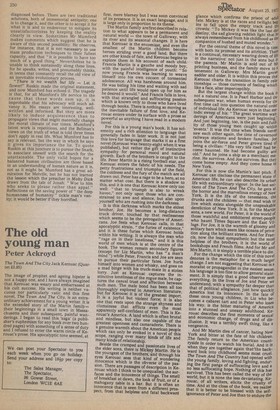Richard Luckett on Mumford and letting life flower
Lewis Mumford is now in his seventy-eighth Year. He has chosen to round off his new selection from his miscellaneous writings and addresses* with a talk given at a symposium held. in 1968, of which the theme was the 'Challenge for Survival.' The talk — and the
),00k cogclude with an exhortation to
remember what the young are saying to us, in words that were first used by John Ruskin:
There is no wealth but life — Let it Flower!" It is a ringing injunction, and at the same time more than a little suspect. It can but have Made a fine climax to his peroration, coming from the lips of an aged ecologist who must, before so very long, face the Great Recycling. Yet it is also potentially glib: it is the kind of thing that we expect to hear primarily from those who can afford to say it, Sentiments that come easily from the youth on an American or European campus are far less hkelY to flourish in post-colonial Africa, or in
Bangladesh
Mumford's great qualification, which must exonerate him from this obvious criticism, is that he has devoted his life to arguing this case and that he has endeavoured, without Stint, to give it practical expression. The Present volume excludes his writings on architecture and planning, but it is impossible to read far without becoming aware of this aspect of his work, just as it is impossible to notice that his concerns have nothing modish ,,about them; they have been constantly to the rOre during some fifty years. Here, then, are the fruits of his thinking: studies in literature, history, biography', technics and society extending, in their dates of composition, over half a century and, in their compass, over the Whole of human history and prehistory. The cumulative wisdom in all this must amount tO something more than a line that would not be out of place in a pop song. The first thing to be said is that Mumford's technique and procedure as a writer give an imPortant clue to his characteristics as a thinker. He is, above all, a synthesiser, with an enviable ability to select the telling facts and instances from apparentlydiverse fields and to assemble them in 'support of a specific argument. In a lecture on standardisation and Choice, which. is ultimately a plea for restrictions on mass production, a whole thesis about the relationship between technics and the visual arts is deployed to demonstrate the point. Mr Mumford writes a great deal about renaissance man,' and it is obvious that his dnliration for those competent in many atfferent spheres of learning and artistry is Matched by an equivalent level of ac
* Interpretations and Forecasts: 1922-1972
Levvis Mumford (Harcourt Brace Jovanovich e4.50).
complishment on his part. At the same time there is a disparity, which can be crudely summarised by saying that renaissance man had, as engineer, painter, musician, writer and whatever else, a prime aim which was to achieve what he could in each area, whilst Mumford uses his knowledge to make statements — his aim is always to encapsulate.
This approach can be both used and abused. For an example of its abuse we need look no further than Marshal McLuhan, who seems at times to propound the equivalence of everything. In a less sophisticated way Spengler, the subject of one of Mumford's studies, moved towards the same conclusion, though he embellished it with the dubious glamour of a Gotterdammerung. Mumford is aware of the danger and his model, in so far as he has one, seems to be Vico, for whom he expresses a great admiration. He shares Vico's belief in the possibility of a science of human society, and he also subscribes to Vico's fundamental tenet that doctrines begin where the subjects that they describe begin. Thus he is committed from the start to a belief in a process of becoming as the basis of human history, and his vast knowledge serves firstly as a means of discerning this process in multifarious activities, and secondly as a means of criticising its end product as manifested in contemporary society.
It is not surprising, therefore, that one of his chief concerns is with the theory of evolution. His admiration for Darwin as a man and a naturalist is tempered by indignation at Darwin's uncritical acceptance of Malthusian notions and his consequent presentation of the evolutionary process as a matter of the survival of the fittest. He goes on to consider why Marx should have so welcomed Darwinism, and enters a forceful plea for Kropotkin's Mutual Aid, both as natural history and as political tract. Yet it is a curious feature of Mumford's work that whilst, on the one hand, he is intent on pointing out that evolution has been a co-operative process his accounts of the development of society and — particularly — of technology have about them a sense of urgency and inevitability that suggests a surrender to the approach which he is so swift to castigate in others. Something of the same ambivalence can be detected in his discussion of Utopias.
Mumford has been fascinated by Utopias all his life. He finds them both intriguing and, at the same time, entirely unsatisfactory; contemplating them he wonders: "How could the human imagination, supposedly 'liberated from the constraints of actual life, be so impoverished?" This seems a very just complaint, but, for all that, Mumford remains fascinated. The essential point is that whilst he is a fierce critic of other people's Utopias Mumford is in fact a Utopian. He is also a fierce critic of the part played in modern society by machinery, but his attacks are always qualified because he believes that mankind can use the machine to make "the first real Age of Man." This, of course, is a Utopian statement.
It is not a coincidence that amongst Mumford's most interesting observations are those on Emerson, Thoreau, Whitman and Henry Adams. A deep interest in the Hog-Reeve of Concord (Emerson actually held this post) can hardly be justified on literary grounds. Rather, we have to suppose that it is a particular quality of character in Emerson that, finding a sympathetic resonance in Mumford, could cause the latter to describe him as "the most liberated mind that the West had produced in many centuries; as liberated as Shakespeare's. It is an odd statement of a man who once wrote that money was " in its effects and laws, as beautiful as roses " and that "property keeps the accounts of the world, and is always moral." Emerson is remarkable for managing to be simultaneously fascinated by the newness and technical progress of the America of his day and, at the same time, equally fascinated by anything mystical. There is a similar duality in Mumford's thought; he believes that man aspires to the divine, he sees elements of this aspiration in man's technical advances, but he is unable to endorse these advances with anything approaching Emerson's enthusiasm.
Given this position it is not surprising that Mumford has to conclude that "what is ideally desirable, at this stage of man's development, does not exist in any past form of man, either biological or social." He does not actually go as far as Arthur Koestler or Edmund Wilson, and suggest a eugenic solution, or a self-inflicted alteration in the chemistry of the brain, but he does look to the emergence of a new self' to meet the demands of what he regards as the present crisis; if at one time he seemed to go along with " new styles of architecture, a change of heart," his present opinions postulate the opposite. It is hardly an original position. The unsatisfactoriness of human nature has been diagnosed before. There are two traditional solutions, both of immemorial antiquity; one is to change it, and the other is to accept it for what it is and to endeavour to mitigate its unsatisfactorin'ess by keeping the reality clearly in view. Sometimes Mr Mumford makes comments which suggest that he is aware of this second possibility. He observes, for instance, that it is not necessary to use mass production techniques to their fullest capacity, and that "it is possible to have too much of a good thing." Nevertheless he is unable to think sustainedly along these lines, for he speaks, writes, and presumably thinks, in terms that constantly recall the old view of an inevitable evolutionary process. "There is no wealth but life — Let it flower!" Ruskin made the original statement, and now Mumford has echoed it. The tragedy is that, for all Mumford's life service to the cause that these words sum up, it is improbable that his advocacy will much advance it. His essays are interesting, wellwritten and informed. But they are more likely to induce acquiescence than to propagate views that might materially change the moral climate of our times. Mumford's latest work is repetitious, and the Bellman's views on the truth of what is told three times don't apply in real life. What Mumford has to say is relevant, but the way in which he says it gives its importance the lie. To quote Ruskin at this juncture is to pursue the Snark, to associate oneself with the search for the unattainable. The only valid hopes for a balanced human civilisation are those based in an understanding of human nature as it is, not as it might be. Mumford has a great admiration for Melville, but he has not learned the lesson which the preacher in Moby Dick draws from the tale of Jonah: "Woe to him who seeks to please rather than appal." Reflections on the saving power of " the deep humanness of humanity" tickle man's vanity; it would be better if they horrified.



































 Previous page
Previous page